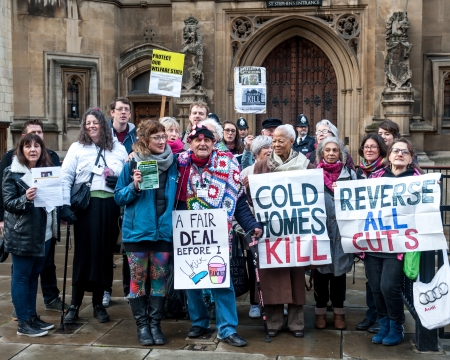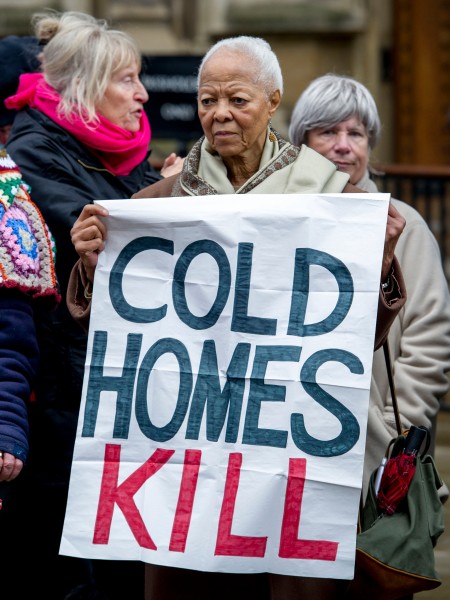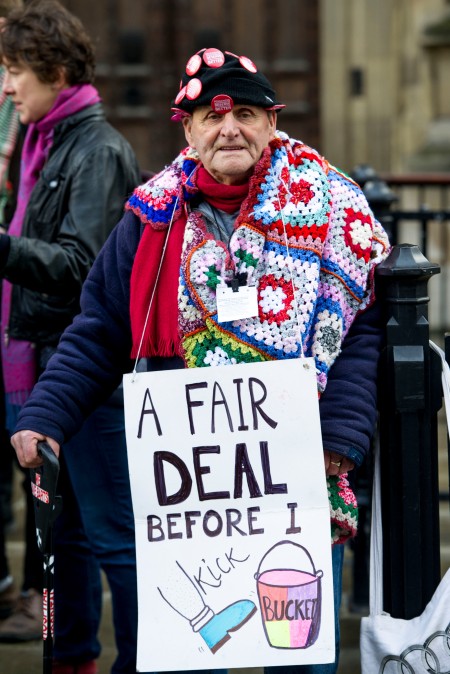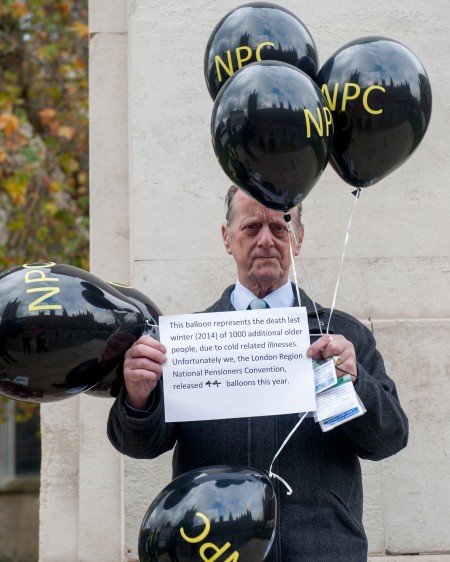Have you considered organising a late-winter ‘warm-up’ action?
Based on the principle that we all have a right to come in from cold homes, these safe and friendly direct actions give people a chance to gather somewhere cosy, get information about their rights and speak about their own situations. They are often led by pensioners. In the past, ‘warm-ups’ have been held in shopping centres, a town hall, the Royal Festival Hall foyer, and a City of London bank.
Last November, we warmed up in the House of Commons! See the report below, by journalist Mamasu Kallon.
Protesters hold Parliament ‘warm-up’ over winter deaths

“If we can’t heat our homes, we have a right to warm up in any public building – including Parliament.” This was the stance taken by pensioners at a ‘warm up’ protest inside Parliament’s Central Lobby on Wednesday.
Members of the Fuel Poverty Action group and Lambeth Pensioners Action Group (LAMPAG) came with blankets, bubble hats, and scarves, to protest against the Excess Winter Deaths that occur each year.
According to figures released by the Office for National Statistics (ONS) there were 43,900 excess winter deaths, during 2013 / 2014 in England and Wales. These figures represent a 151% increase on the winter of 2012 / 2013. It is the biggest increase in deaths since records began. The majority of deaths (36,300) occurred among people aged 75 and over.
The ONS data compares the number of deaths that occurred from December 2014 to March 2015 with the average number of deaths that occurred in the preceding August to November, and the following April to July. It shows there was a 27% rise in deaths over winter compared with the non-winter periods.
Laura, from Fuel Poverty Action, who organized the ‘warm-up’ said: “These shocking figures have been released on the same day as the Spending Review, meaning it’s a good day for the government to bury bad news.”
“The announcement of cuts to fuel poverty spending, sustainable energy and other vital welfare measures will only make things worse and will subject people to another painfully cold and precarious winter. The government has blood on their hands. Their inaction is condemning thousands more people to death from cold homes.

Once inside Parliament’s Central Lobby, protesters unfurled banners depicting 43,900, to represent the number of deaths last winter. They chanted “No more deaths from fuel poverty” as tourists and parliamentarians looked on.
The police warned the group they would be forcibly ejected if they continued chanting, since protests are forbidden inside Parliament. However the chanting and speeches continued for some time as the police were reluctant to be seen manhandling the elderly. The stand off came to end when Green Party MP, Caroline Lucas entered the Central Lobby.
Amongst those who were able to directly lobby Lucas was Gill Thompson. Her brother, David Clapson, a former soldier, died just weeks after being sanctioned. She told Lucas: “My brother was a type 1 diabetic who couldn’t afford to put electricity on his key. He couldn’t afford to keep his insulin cold in the fridge or food.”
“They [the DWP] say they made no errors but they knew he was a diabetic. He wasn’t a scrounger; he worked 29 years of his life. His body was found next to a pile of CV’s. I started a campaign and we got a Select Committee inquiry. One of the recommendations was an independent inquiry into his death and into the deaths of those sanctioned. Both have been refused.”
Caroline Lucas said: “I’m hugely shocked by the figures as they are unacceptable, but on another level it’s not so shocking. It’s the logical consequence of the policies of a government that doesn’t care about its poorest.”
“Everything I have heard from you, are stories about real people facing enormous hardship, mostly invisibly. This is not the thing that George Osborn goes to bed thinking about.”
She urged the government to take action: “The Big six are monopoly powers and have far too much power over us, we need to democratise our energy systems so that people have the power, not the big energy companies.”

Official statistics identify 2.35 million households in fuel poverty. However, Fuel Poverty Action, say that these figures “mask” the reality of the situation. They argue that based on the previous definition (10% of disposable income spent on energy) over 6 million households are in fuel poverty. Fuel poverty is now based on the ‘High-Cost, Low-Income’ model whereby households must have ‘above average fuel costs’ that leave a residual income below the official poverty line. “The redefining [in 2013] of fuel poverty is highly political and hides the fact that 1 in 4 families are forced to choose between heating and eating,” Laura from Fuel Poverty Action said.
Peter Smith, Head of Policy at National Energy Action (NEA) said: “Sadly NEA have been expecting there would be a significant rise in premature mortality last year and fuel poverty will remain a bigger killer across the UK than road accidents, alcohol or drug abuse combined.”
“In our UK Fuel Poverty Monitor, 2014-2015 we estimated that in addition to 125,000 needless deaths across the UK over the next 15 years, national health services in England and Wales could also be forced to spend £22 billion treating cold-related morbidity over the same time frame.”

Caroline Abrahams, Charity Director at Age UK, said; “The problem is we face a toxic combination of some of the coldest, most draughty homes in Europe, high energy bills and the absence of a comprehensive energy efficiency scheme to support older people in insulating their homes, so they can protect themselves against the very real threat of cold to their health.”
“Many countries with colder climates than ours have far better records on cold-related deaths, showing we should be doing much better than we currently are. Cold homes have life and death consequences for older people and we should be deeply ashamed of that in an affluent country like ours.”

As the ‘warm-up’ in Parliament ended protestors walked to Old Palace Yard to meet members of the National Pensioners Convention. Together they released 44 black balloons, one for every 1,000 people who died last winter from cold-related illnesses.
A Department of Health spokesperson said: “Excess winter deaths can be due to a number of causes including cold snaps, flu and other respiratory infections. “Flu is serious, causing severe illness and deaths in winter. It is vital that older people, pregnant women and those with a health condition get their flu jab this winter.”
“Our cold weather plan sets out a series of actions that health and social care organizations, voluntary groups, and individuals can take to plan for cold temperatures and help reduce cold-related illnesses and deaths.”
As protesters dispersed, Betty, 79 said: “They keep telling us that ‘you pensioners are getting it easy,’ they say ‘look how much we do for you.’ I know people who don’t put their heating on because they cant afford the bill. Are we really getting it that easy?”
This article is reposted from journalist Mamusu Kallon’s blog: https://mamusukallon.wordpress.com

